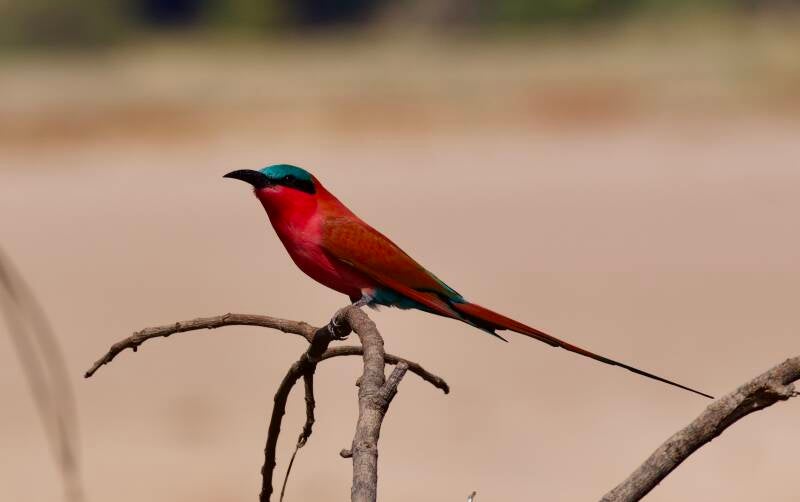
Photo of the week
Highlight of the week: Sundowners with whisky tasting on the bank of the Luangwa
Lowlight of the week: A last minute cancellation at a camp for a screening session puts our calendar in disarray
Maximum temperature: a whopping 38 degrees Celsius
Rainfall: Nada
As a teenager I was quite strait-laced. Not that I was desperate to conform. More that I wanted to keep my head down. Keep out of trouble. To make something of myself. I didn’t want to fall in with the wrong crowd. Mud sticks and I wanted my life to be worth something. I have always been inclined to follow the rules. But knowing which rules are worth their salt and which ones could be bent for the sake of progress was tricky. I had an older brother who skated close to the line. An older sister who was across the other side of the line more often than she ate hot dinners. My line was not obvious. If I could have spoken to my future self, my teens would have been so much easier to navigate.
It’s Wednesday morning. I’m working with Sarah. One of our volunteer Zambian nurses. She has been qualified for 1 year. Quite new at the job. She is patiently waiting for a posting from the government. Anywhere in the country. But until then, she has no option. Either work voluntarily in the clinic. Or sit and wait at home. Luckily for us, she has chosen the former. But she is still very green. She normally works alone. And has no one to guide her. To teach her. To mentor her. To help her with pattern recognition. To recognise simple illnesses. And to help her able to separate the mundane from the complex. I’m happy to support Sarah. To steer her away from antibiotics for common colds. Antibiotics for diarrhoea. Antibiotics for Flu. On Wednesday morning, prescriptions for antibiotics drop. Markedly.
Rachel is our next patient. She has brought her mother today. Rachel is 17 years old. Sarah saw her last week and has brought her back for me to see today. Rachel has numbness of the left arm. From the elbow to the hand. For the past 2 weeks. No pain. The arm still works normally. No rash. No neck pain. Just numbness. I examine Rachel. The numbness does not fit into any anatomical distribution that makes any obvious medical sense. There is nothing else to find. Sarah had given Rachel a vitamin B injection last week. Not surprisingly her symptoms are no better. Perhaps she needs another injection suggests Sarah.
I hope you don’t mind me digressing for a moment. Rachel and Sarah can wait. I’m not one to blow my own trumpet. So, I’ve asked Keith to rewrite this paragraph. In a previous life, I was something of a guru in young people’s health. The 12-19 year age group to be more specific. I made sure that young people had a voice in Teesside. I made sure that their own needs and goals where prioritised. And that healthcare workers listened. Teen years are a time of great change. The body changes. Relationships with parents change. Independence is sought. Risk taking increases. Young people with medical problems are at particular risk. Teens slowly, or not so slowly, disentangle their parents from being responsible for their health. Learning to take responsibility for themselves. To handle all of this sensitively and expertly our doctors, nurses and allied professionals need a whole new set of skills. Communication. Patience. Time. Empathy. Young people are very special.
As a paediatric consultant, I learnt a whole new way of communicating with young people. We tied it all together with a pneumonic called HEADSSSS. Each of the letters marks the way: Home; Education; Alcohol; Drugs; Social life; Smoking; Sexual health; Safety.
The map is clear but navigating the way markers skilfully takes nouse.
We try to build up a picture of the young person. To put their medical issues into some kind of context. To divine risk-taking behaviour. Not because I’m nosey. But because the British system has possible solutions to these social aberrations. For example, if I was told that a young person was taking drugs or using alcohol in a dangerous way, I would signpost them to seek support from specialists in the community to help them with this. They are not alone. Experts and sounding posts fill their voids.
HEADSSSS is the pinnacle of medical communication. It takes time. Patience. Nouse.
Imagine my surprise on day one. Our first day back in the clinic this year. When I found flip-chart notes from a HEADSSSS lesson adorning the wall of my consulting room.
Clearly there has been some training here in the past 12 months. Perhaps from a government initiative? Or a well-meaning NGO? But this is the only evidence of paediatric master craftmanship. 7 weeks of sharing consultations with our clinicians has failed to unmask any other signs. Perhaps the poster on the wall is here just to cover up a very large crack? Aside from this poster Kakumbi is very much a HEADSSSS-free zone. At least until this Wednesday that is.
We’ve made Rachel and Sarah wait for quite long enough. Let’s re-join them. Sarah wants to know what’s on my mind. I venture into the concept of functional illness. I take Sarah and Rachel on a journey. The physical examination is brief. Rachel’s numbness pattern does not have a clear medical explanation.
We explain to Rachel and her mum that it is routine to see Rachel without her mum to start with. And tell Rachel that anything that she shares with us will be kept between us unless her safety is at serious risk. We probe gently. Not judging. Reassuring. Watching body language. Being aware how far to push things. Using silence as a tool. Not the easiest thing to do in a foreign language. With translation. Not interpretation. Language is key.
The HEADSSSS box of tricks opened Rachel’s story. Mum and Rachel were struggling. Home was stressful. Dad drinks too much. Some domestic violence. And dad is thrown out. Mum without income. Struggling to get food for Rachel. Rachel missing too much school. Sad. Low.
Pandora’s box is open. It is not my place to close it. So now what? In the UK, with this kind of response, we can call the cavalry. Find support. School counselling. Social services. Benefits. Ways to support a family through hard times.
What can I offer Rachel? My nurse, Sarah, just looked at me. There is nothing she told me. I enquired about community support? Village elders? Girl’s school groups? School counsellors? Social services support? Each suggestion met with a blank face.
We explain to Rachel and her mother that there is nothing serious going on with her arm. We try to explain the link between wellbeing and functional illness. We try to signpost her to community support. But Pandora should not have opened this box without a means to tame the evils of humanity in our Zambian Valley.
I now know why the HEADSSSS screening tool is not used here. HEADSSSS was clearly introduced by well-intentioned trainers. But for now, it has little role. What is the point of knowing about the vicissitudes of teenagers if we have nothing we can do about them?
Perhaps the conversation that we had with Rachel and her mum helped? To air their plight might have lessened their sense of isolation. I doubt it though. Their monkey certainly jumped onto my shoulders on Wednesday. I feel their hopelessness. Empathy has burdened me with guilt. I have. They have not. Perhaps another vitamin injection would have been better.

The Southern carmine bee-eaters are back in town

The HEADSSSS screening tool


Thumb down - Thumbs up

A tricky extraction. Achieved with a bic biro

Another day. Another office

A legless giraffe
Add comment
Comments
Actually I ate a lot of salad in my youth….. who would be a teenager again? 😜
Great blog as usual. The nasal foreign body removed by biro - keeping the mouth shut and blowing through the empty biro tube up the other nostril is a great trick I learned in Kakumbi. For FBs in the ear canal I used to snip off the point of a blue needle and turn the end into a small hook. Slide the needle with the hook flat past the object, twist through 90 degrees and try to pull the FB out. Using forceps rarely works.
Great post. Beautiful pic of the bee-eater! Got some cpd in too, many thanks!
Nasty de-gloving, hope it’s healed up ok.